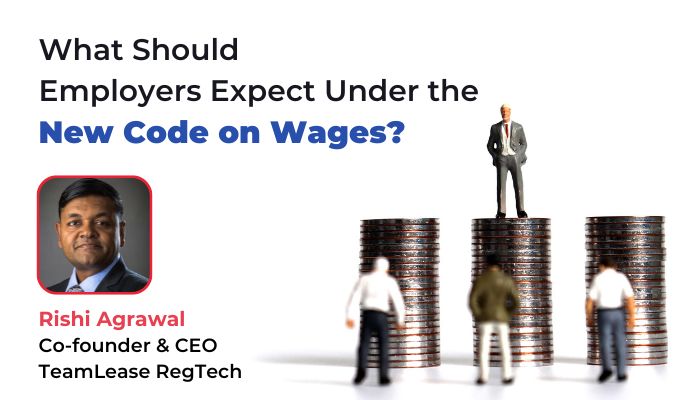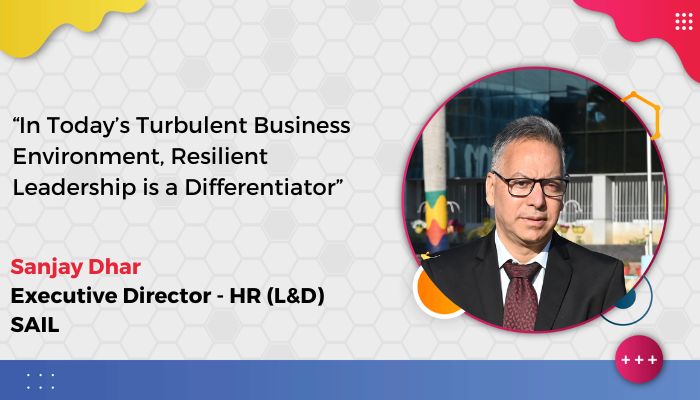Rishi Agrawal, Co-founder and CEO, TeamLease RegTech, pen down the overarching changes introduced in the Code and their potential effect on the employer compliance universe.
India’s economic achievements in the past few years have been incredible. It added more to its GDP in the last 5 years than it did in its first 50 years of independence. It is home to the world’s fastest growing startup ecosystem, crossing the 65,000 mark earlier this year. While it took India 70 years to reach the milestone of 50 unicorns, it doubled this number in just 5 years. The ambitious goal of becoming a $10 trillion economy is the next logical destination for India to position itself as a global economic powerhouse.
To bring this journey to fruition, the four factors of production – land, labour, capital and entrepreneur – must become India’s allies. Initiative towards ease of doing business must also play a defining role in propelling India’s growth trajectory. Unfortunately, Indian employers are operating in the 21st century with the regulatory plumbing of 20th century labour laws. The colonial-era labour laws designed to address the socio-economic exigencies of the time have outlived their welcome in the new era of development. This asynchronous labour regime has held back businesses in the country for several decades. India is yet to unleash the full potential of its entrepreneurial spirit as its labour landscape yearns for a much-needed overhaul.
While the need for labour law reforms has persisted for years, it was only in 2020 that India finally embarked on a long-overdue journey of reimagining its labour law regime. The enactment of the four new Labour Codes has set the stage for India to usher in the next phase of economic boom. Over the past few days, the conversation around the Code on Wages, 2019 (“Code”) has grown louder, with experts anticipating its enforcement soon. This article takes a look at the overarching changes introduced in the Code and their potential effect on employer compliance.
A welcome move towards uniformity
The Code subsumes four labour laws – Payment of Wages Act, 1936, Minimum Wages Act, 1948, Payment of Bonus Act, 1965 and Equal Remuneration Act, 1976. In doing so, it eliminates inconsistencies in the definition of ‘wages’ across these laws. To illustrate, house rent allowance was excluded from the definition in Payment of Wages Act, 1936 but included in Minimum Wages Act, 1948. Now, there is a single definition of wages, bringing much clarity for employers.
The term ‘wages’ is defined as all remuneration by way of salary, allowances or otherwise, payable to an employee on fulfilment of the terms of employment. While basic pay, dearness allowance and retaining allowance are included, items like bonus, contributions to pension and provident fund, gratuity, house rent allowance, overtime allowance and commission, among others, are excluded.
The Code also broadens the applicability criteria across the four labour laws. For instance, Payment of Wages Act, 1936 and Minimum Wages Act, 1948 applied only to workers below a particular wage limit working in Scheduled Employments. The Code, however, applies to all establishments where any industry, trade, business, manufacture or occupation is carried on, irrespective of the wage threshold or type of employment.
The good, bad, and the ugly in take-home wages
One major change under the Code is that the basic wage component cannot be less than 50% of the gross pay. This will have two broad implications. First, employers’ contributions towards provident fund, pension and gratuity (calculated as a percentage of basic pay) are likely to rise. Second, employers will have to pay lesser allowances (excluded from basic pay) since these cannot exceed the 50% threshold.
The Union government will also fix a floor wage taking into consideration the living standards of workers in different geographical areas. The minimum wages notified by State governments must be higher than the floor wage. Employers are prohibited from paying wages less than the notified minimum wages.
Rationalised penalties and compounding
An employer who pays an amount to the employee which is less than what is due is liable to pay a fine extending to Rs. 50,000. A repeat offence within 5 years will attract imprisonment of up to 3 months or a fine up to Rs. 1 lakh or both. A contravention of any other provisions of the Code or rules/orders thereunder is punishable with a fine up to Rs. 20,000. A repeat offence within 5 years can lead to imprisonment of up to 1 month or a fine up to Rs. 40,000 or both.
The Code also makes provisions for compounding of offences that are punishable either without imprisonment or with both imprisonment and fine. Such offences may be compounded by a Gazetted Officer for a sum of 50% of the maximum fine provided for such offence. The accused can apply for compounding either before or after the institution of any prosecution in the prescribed manner.
Key takeaways
The Code on Wages, 2019 is a forward-looking labour legislation that streamlines the earlier labour laws on wages. Not only does it standardise and broaden the applicability and definitions, but it also rationalises penalties and permits compounding of offences. Although the deviation from the previous legislation is not very substantial, it is well-intentioned in removing obsolete, irrelevant and inconsistent provisions.
Although 7 States and Union Territories are yet to notify their respective rules on the Code, employers will most likely have to review, reassess and realign their wage-related compliances. A thorough revision of the payroll processes, salary structures and wage policies will have to be undertaken to ensure compliance with the Code and state rules. However, the actual impact of the Code on the employers will become apparent only when it comes into force on the ground.
You might also be interested to read: The Path Ahead for Strengthening Compliance Management
About the Author
Rishi Agrawal is Co-founder and CEO at TeamLease RegTech. He is a passionate technology entrepreneur who believes in the potential of technology to transform human lives. Over the past few years, Rishi has been working on developing a regulatory technology platform to automate and simplify India’s complex compliance environment. He has worked with over 1,000 organisations (Enterprises & MSMEs) across 40 Industries in India helping them through their compliance management journey. He deeply understands the complexity of managing compliances across central, state and local governments. He has been partnering with corporate India, industry bodies and think-tanks to enable Compliance 3.0. He created the four vector framework of rationalisation, simplification, digitisation and decriminalisation. Rishi served as an advisor to the WGOM (Working Group of Ministers), works closely with several ministries, DPIIT, Invest India and World Bank on various ease of doing business initiatives. He is also a member of CII Taskforce for Ease of Doing Business. Rishi frequently writes in ORF (Observer Research Foundation), Financial Express, India Today, Mint among others.






